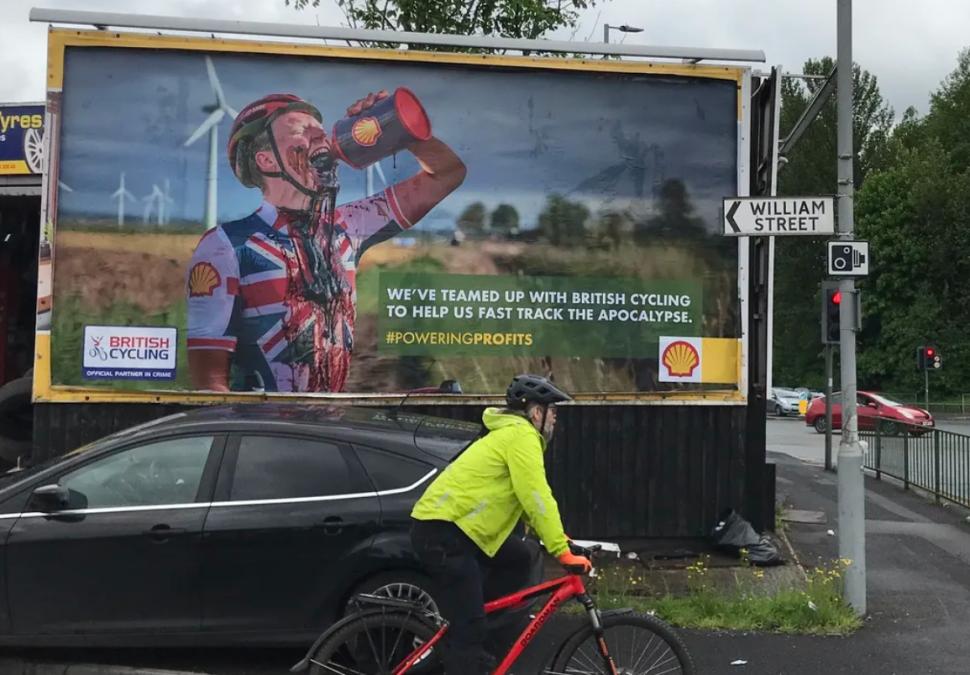- News
- Reviews
- Bikes
- Accessories
- Accessories - misc
- Computer mounts
- Bags
- Bar ends
- Bike bags & cases
- Bottle cages
- Bottles
- Cameras
- Car racks
- Child seats
- Computers
- Glasses
- GPS units
- Helmets
- Lights - front
- Lights - rear
- Lights - sets
- Locks
- Mirrors
- Mudguards
- Racks
- Pumps & CO2 inflators
- Puncture kits
- Reflectives
- Smart watches
- Stands and racks
- Trailers
- Clothing
- Components
- Bar tape & grips
- Bottom brackets
- Brake & gear cables
- Brake & STI levers
- Brake pads & spares
- Brakes
- Cassettes & freewheels
- Chains
- Chainsets & chainrings
- Derailleurs - front
- Derailleurs - rear
- Forks
- Gear levers & shifters
- Groupsets
- Handlebars & extensions
- Headsets
- Hubs
- Inner tubes
- Pedals
- Quick releases & skewers
- Saddles
- Seatposts
- Stems
- Wheels
- Tyres
- Health, fitness and nutrition
- Tools and workshop
- Miscellaneous
- Tubeless valves
- Buyers Guides
- Features
- Forum
- Recommends
- Podcast
 Brandalism's anti-Shell British Cycling ads (Simon Warren, X)
Brandalism's anti-Shell British Cycling ads (Simon Warren, X)“When British Cycling teamed up with Shell, many of us puked our bodies inside out”: Cyclists praise climate activists’ guerilla ad campaign as Shell slams “misleading” billboards
A striking billboard campaign condemning Shell’s sponsorship of British Cycling – the latest high-profile criticism of the governing body’s much-derided relationship with the oil and gas giant – has earned praised from cyclists and environmental campaigners across the UK, who say they remain “frustrated and angry” by British Cycling’s decision to take Shell’s “dirty money”.
However, Shell says the “hacked” billboards, the work of social and climate activists Brandalism, are “misleading” and “completely mischaracterise” the company’s partnership with British Cycling, while the cycling governing body responded by pointing out that Shell is supporting its “long-term sustainability strategy” and describing the partnership as “making a positive impact on our sport”.
This week, as Shell prepares to host its AGM in London, over 200 fake adverts have been placed without permission satirising the oil company’s environmental stance across the capital, as well as in Manchester, Reading, Norwich, and Bristol by Brandalism, a self-described “guerilla art collective” which targets consumerist culture through “hacked” ad campaigns.
While Brandalism’s campaign against Shell aims to skewer all aspects of what it believes is the company’s “powering profits” agenda, a number of cycling-specific ads – targeting the sponsorship deal British Cycling signed with Shell in 2022 – have popped up, especially near the governing body’s headquarters in Manchester.
> "Greenwashing, pure and simple" - fury as Shell UK sponsors British Cycling
One of the billboards shows a cyclist dressed in a mocked-up version of the Team GB kit drinking from a barrel of Shell-brand oil, with the slogan: “We’ve teamed up with British Cycling to help us fast track the apocalypse”. British Cycling’s logo, meanwhile, has also been modified to read “Official Partner in Crime.”
Another poster shows a cyclist slipping on oil and falling from his bike, with the tag line: “Shell, pedalling lies since 1970. Now proudly polluting British Cycling.”
Tona Merriman, the co-founder and spokesperson for Brandalism, said the campaign was a response to Shell “co-opting the emotional connections we have with sports to launder their dirty brand”.
“As Shell’s executives gather for its AGM, the oil company’s PR strategies to obscure its accelerating fossil fuel production during the climate emergency need exposing,” Merriman said in a statement.
“Shell is advertising to kids, cosying up to politicians, paying influencers, and co-opting the emotional connections we have with sports to launder their dirty brand.
“But behind its billion-dollar marketing efforts Shell is back pedalling on its own green pledges, profiting from our soaring energy bills and facing legal challenges across the globe for violating human rights. We’re urging shareholders, sports organisations and influencers to see past the greenwash and drop Shell – it is not only a bad faith actor, it is a legal, financial, and reputational risk.”
> British Cycling and Shell: THAT very controversial deal discussed
The thought-provoking campaign has won praise from cyclists and climate activists who have been critical of British Cycling’s association with Shell, since the governing body agreed an eight-year sponsorship deal with the multinational oil and gas company in 2022, a partnership that attracted accusations of greenwashing and led to many cyclists revoking their British Cycling memberships.
“Pro cycling’s sell-out to the oil and gas industry (as well as petro-states) is utterly pervasive. Fuck this shit,” Neil Winkleman wrote on X.
“I’m extremely frustrated and angry that an organisation like British Cycling would take Shell’s dirty money. It makes you wonder what the point is.”
“These Brandalism posters bring me much joy!” added climate activist Peter Knapp. “When British Cycling decided to ‘team up’ with Shell, many of us puked our bodies inside out.”
“It was a bad look when British Cycling took Shell’s polluter dollar, it’s much worse since the oil giant ditched climate targets and doubled down on putting profits before life and health,” wrote Andrew Simms, the co-director of the New Weather Institute.
> Chris Hoy: British Cycling deal can ‘put cycling on Shell’s agenda’
In response to the billboard campaign, a British Cycling spokesperson said: “Through our partnership, Shell UK has made a long-term commitment to cycling in Britain.
“Our Limitless disability and para-cycling programme along with support in the development of our long-term sustainability strategy which will be published later this month, are both tangible examples of how we are together making a positive impact on our sport.”
“We respect people’s right to express their point of view and welcome any constructive engagement on our strategy and the energy transition,” a Shell spokesperson added.
“However, these protest ads are misleading, not constructive, and completely mischaracterise the nature of our partnership with British Cycling.
“Shell UK continues to support British Cycling and the Great Britain Cycling Team’s cyclists and para-cyclists through the sharing of technology and innovation, widening access to cycling, and accelerating decarbonisation efforts.”
> Extinction Rebellion protest British Cycling's Shell deal at National Cycling Centre
Brandalism’s billboards aren’t the first time British Cycling’s deal with Shell – which the governing body claimed at the time would “widen access to the sport, support our elite riders, and help our organisation and sport take important steps towards net zero” – has been the focus for protesters.
In November 2022, Extinction Rebellion activists climbed onto the entrance of the National Cycling Centre in Manchester to protest the partnership, displaying a banner demanding ‘Get Shell out of British Cycling’ and holding smoke bomb-like devices.
The partnership also prompted a fierce backlash from cyclists across the UK, many of whom cancelled or threatened to cancel their British Cycling memberships in protest at what they believe is Shell’s attempt to ‘greenwash’ its environmentally damaging activities by investing in an activity associated with sustainable, healthy living.
In the wake of the announcement, one British Cycling member, a trained ride leader for the organisation’s Breeze women-only rides, said that the energy company “stands for everything we everyday cyclists don’t,” while another who has belonged to the organisation for more than a quarter of a century said that the sponsorship was “green washing for [Shell UK], plain and simple.”
After obtaining a PhD, lecturing, and hosting a history podcast at Queen’s University Belfast, Ryan joined road.cc in December 2021 and since then has kept the site’s readers and listeners informed and enthralled (well at least occasionally) on news, the live blog, and the road.cc Podcast. After boarding a wrong bus at the world championships and ruining a good pair of jeans at the cyclocross, he now serves as road.cc’s senior news writer. Before his foray into cycling journalism, he wallowed in the equally pitiless world of academia, where he wrote a book about Victorian politics and droned on about cycling and bikes to classes of bored students (while taking every chance he could get to talk about cycling in print or on the radio). He can be found riding his bike very slowly around the narrow, scenic country lanes of Co. Down.
Latest Comments
- bensynnock 2 hours 49 min ago
As somebody with two daughters in youth football teams, the cost of the boots hardly scratches the surface of the expense. There's the £30 a month...
- Rik Mayals underpants 6 hours 20 min ago
Here's my cycling related Christmas gift. Beautiful enamel garage sign to go above my Campagnolo Super Record RS equipped Colnago.
- Rendel Harris 10 hours 28 min ago
No idea if Cancellara was using a motor or not, I hope not as I greatly enjoyed him as a rider, but the tech was certainly available, I can...
- wtjs 12 hours 6 min ago
Fair enough:...
- SecretSam 13 hours 17 min ago
Usual ugly Pinarello, bumps and curves where they aren't needed. And, according to Mapdec, not well built.
- Rome73 15 hours 24 min ago
That's not strictly true - Reform will legalise immigrant baiting, trans bashing and tar and feathering of anyone woke. Loads of fun for all the...
- Rendel Harris 15 hours 11 min ago
What's a "legitimate cyclist" please? Someone who doesn't conform to your arbitrary norms? At the age of 56 I admit that you have 13 years more...
- mattw 1 day 5 hours ago
This risks turning me into a hanger and flogger....
- Spangly Shiny 1 day 11 hours ago
I had the pleasure of owning two of the featured builders here, in my history. When I joined the Army in 1971, I took with me my curly Hetchins:...



Add new comment
35 comments
"who need to stop breathing"
Still the same paragon of logic and information I see. If I read any more stuff like this from you, I'll start to be really rude...
Oh dear. That doesn't sound very healthy. Mind you don't hurt yourself.
An average commuter bike weights 12-13 kg, of which I guess no more than 2 kg must be the petroleum stuff.
With 2kg of gasoline you go around 20kms on an urban area with a non hybrid car. So a bicycle can offset its petroleum use in just a car commute day, which is not too shabby, isn't it?
In general though, and I will include me here, there is disproportionate interest on car emissions, while there are two things that often we miss their scale, food and home heating. Actually e-bikes than bikes are more efficient CO2-wise, given that you have to burn calories.
So if you really want to be eco, don't just cycle, go skinny and vegan and insulate well your house/install heat pump.
wow, what a pathetic strawman argument. No one is calling for an immediate end to oil use today. But with every government (aside from the oil states, go figure) agreeing that carbon emissions need to come down to avert catastrophic global warming, the direction of travel is still towards more carbon emissions and not less, this is what is driving the protests. There is no driver to look for anlternative solutions, becuase oil productions is just being increased to meet growing demands. Might as well criticise someone who complains about levels of obesity for eating food occasionally.
Also the objective isn't to maximise the amount of oil still in the ground, it's to minimise the amount of carbon going into the atmosphere, so any oil fraction used for physical things is oil which is not being burned. unless it ends up in an energy from waste plant. (rubbish powered electricity generation)
Pages